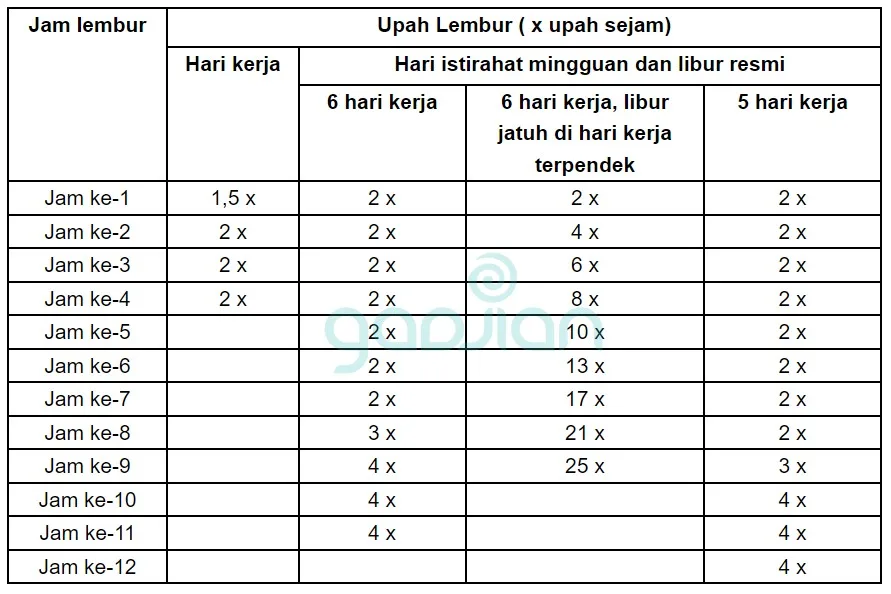Upah atau gaji adalah hak pekerja yang diterima dan dinyatakan dalam bentuk uang sebagai imbalan dari pengusaha atau pemberi kerja, yang ditetapkan dan dibayarkan menurut perjanjian kerja, kesepakatan, atau peraturan perundang-undangan, termasuk di dalamnya tunjangan bagi pekerja dan keluarganya.
Dalam UU Cipta Kerja terbaru, Pasal 81 Angka 28, disebutkan bahwa hak pekerja atas upah timbul sejak terjadi hubungan kerja hingga berakhirnya hubungan kerja. Upah dapat dibayarkan berdasarkan satuan waktu atau satuan hasil.
1. Pembayaran Upah atau Gaji
Bentuk dan cara pembayaran upah (penggajian) diatur dalam PP Pengupahan. Upah harus dinyatakan dalam bentuk mata uang rupiah RI dan dibayarkan seluruhnya pada setiap periode penggajian, tidak boleh dicicil. Periode penggajian bisa harian, mingguan, atau bulanan. Jangka waktu pembayaran gaji tidak boleh melebihi 1 bulan.
Pengusaha wajib membayar upah pada waktu yang telah diperjanjikan atau pada tanggal penggajian. Dalam hal hari atau tanggal penggajian yang disepakati jatuh pada hari libur atau istirahat mingguan, maka pelaksanaan pembayaran gaji diatur dalam perjanjian kerja, peraturan perusahaan, atau perjanjian kerja bersama.
Upah dapat dibayarkan secara langsung kepada karyawan maupun melalui bank. Dalam hal upah dibayarkan melalui bank, maka upah harus sudah dapat diuangkan oleh pekerja pada tanggal penggajian yang disepakati.
Pembayaran upah dinyatakan terlambat apabila dilakukan lebih dari 3 hari dari tanggal penggajian, dan pengusaha dikenai denda dengan ketentuan:
- Mulai hari ke-4 sampai hari ke-8 dari tanggal penggajian, dikenakan denda 5% untuk setiap hari keterlambatan.
- Sesudah hari ke-8, apabila upah belum dibayarkan, dikenakan denda huruf a ditambah 1% untuk setiap hari keterlambatan, namun tidak boleh melebihi 50% upah.
- Sesudah sebulan, apabila upah belum dibayarkan, dikenakan denda huruf a dan b ditambah bunga tertinggi yang berlaku pada bank pemerintah.
Pada saat penggajian, pengusaha wajib memberikan bukti pembayaran upah yang memuat rincian upah yang diterima pekerja. Bukti pembayaran upah ini berupa slip gaji karyawan yang memuat komponen upah dan komponen non-upah.
Pelajari contoh bukti pembayaran upah!
2. Komponen Upah
Upah dapat terdiri atas komponen gaji tanpa tunjangan; atau gaji pokok dan tunjangan tetap; atau gaji pokok, tunjangan tetap, dan tunjangan tidak tetap; atau gaji pokok dan tunjangan tidak tetap.
a. Gaji pokok
Gaji pokok merupakan imbalan dasar atas pekerjaan. Dalam hal upah karyawan terdiri atas gaji pokok dan tunjangan tetap, maka besaran gaji pokok sekurang-kurangnya 75% dari upah.
Namun, apabila upah terdiri atas gaji pokok, tunjangan tetap, dan tunjangan tidak tetap, maka besaran gaji pokok sekurang-kurangnya 75% dari jumlah gaji pokok dan tunjangan tetap.
Gaji pokok karyawan berpedoman pada struktur dan skala upah. Ada beberapa cara dalam menentukan besaran gaji pokok untuk sebuah pekerjaan, antara lain berdasarkan survei pasar, bobot jabatan, kemampuan perusahaan, pengalaman kerja, dan upah minimum setempat.
Lebih lanjut, baca cara menentukan gaji pokok!
b. Tunjangan tetap
Tunjangan tetap merupakan komponen upah yang dibayarkan secara tetap dan teratur bersamaan dengan periode pembayaran gaji pokok. Contohnya adalah tunjangan jabatan dan tunjangan daerah.
c. Tunjangan tidak tetap
Tunjangan tidak tetap merupakan komponen upah yang dibayarkan dalam jumlah tidak teratur atau berdasarkan kehadiran. Contohnya adalah uang makan atau uang transport yang hanya dibayarkan apabila karyawan masuk kerja.
Namun, jika uang makan/transport diberikan dalam jumlah tetap setiap bulan tanpa dipengaruhi kehadiran, maka termasuk tunjangan tetap.
3. Tunjangan Hari Raya
Tunjangan hari raya atau THR keagamaan merupakan komponen non-upah yang wajib dibayarkan pengusaha 1 kali dalam setahun sebelum hari raya keagamaan.
Hari raya keagamaan yang dimaksud adalah Idulfitri bagi karyawan beragama Islam, Natal bagi karyawan Kristen dan Katolik, Waisak bagi karyawan Buddha, Nyepi bagi karyawan Hindu, dan Imlek bagi karyawan Konghucu.
Tata cara pembayaran THR diatur dalam Peraturan Menteri Ketenagakerjaan No 6 Tahun 2016.
a. Perhitungan THR
THR wajib diberikan kepada karyawan yang telah bekerja minimal 1 bulan di perusahaan. Besaran THR adalah 1 bulan upah bagi karyawan yang telah bekerja 12 bulan atau lebih terus-menerus, dan proporsional untuk karyawan yang bekerja lebih dari 1 bulan tetapi kurang dari 12 bulan.
|
Masa Kerja
|
Besaran THR
|
|
Lebih dari 1 bulan, dan kurang dari 12 bulan
|
Masa kerja x upaâ„Ž 1 bulan12
|
|
Lebih dari 12 bulan
|
Upah 1 bulan
|
Sedangkan upah yang dijadikan basis perhitungan THR dapat berbeda-beda sesuai kebijakan perusahaan, bisa gaji pokok saja atau gaji pokok dan tunjangan tetap.
Simak contoh perhitungan THR proporsional!
b. Bentuk THR
THR hanya dapat diberikan dalam bentuk uang rupiah, tidak dapat diberikan dalam bentuk selain uang. Paket hari raya berupa voucher, sembako, parsel, dan hadiah lainnya tidak dihitung sebagai THR.
c. Waktu pembayaran THR
THR wajib dibayarkan oleh pengusaha paling lambat 7 hari sebelum hari raya keagamaan. Misalnya, Idulfitri jatuh pada 10 April, maka pembayaran THR Lebaran dilakukan selambat-lambatnya tanggal 3 April. Begitu pula untuk THR Natal, diberikan paling lambat 18 Desember.
d. THR bagi karyawan yang berhenti bekerja
Apabila karyawan tetap (PKWTT) mengalami PHK atau berhenti atas kemauan sendiri dalam kurun waktu 30 hari sebelum hari raya keagamaan, maka karyawan bersangkutan tetap berhak atas THR. Namun, jika karyawan kontrak (PKWT) berhenti karena jangka waktu kontrak berakhir atau pekerjaan yang diperjanjikan telah selesai sebelum hari raya, maka tidak berhak atas THR.
e. Pajak THR
THR termasuk objek pajak penghasilan. Dalam perhitungan PPh 21 terbaru 2024 berdasarkan PP No 58 Tahun 2023, pajak THR tidak dihitung terpisah dari pajak gaji. PPh 21 langsung dikenakan atas jumlah penghasilan bruto sebulan, termasuk gaji dan THR, dengan menggunakan tarif efektif rata-rata (TER).
f. Sanksi denda
Berdasarkan Permenaker No 6 Tahun 2016, pengusaha yang tidak membayar THR dikenakan sanksi denda 5% dari jumlah THR yang seharusnya dibayarkan. Denda ini tidak menghilangkan kewajiban pengusaha atas pembayaran THR.
4. Pemotongan Upah
Pemotongan upah karyawan dapat dilakukan oleh pengusaha atas slip gaji karyawan untuk pembayaran berikut ini:
- Denda
- Ganti rugi
- Uang muka upah atau kasbon
- Utang atau cicilan utang karyawan
- Sewa rumah atau sewa barang milik perusahaan
- Kelebihan pembayaran upah
- Pemotongan upah untuk pihak ketiga berdasarkan surat kuasa dari karyawan
Selain itu, pemotongan upah juga dapat dilakukan untuk kewajiban pembayaran oleh karyawan terhadap negara, yang ketentuannya diatur dan ditetapkan dalam peraturan perundang-undangan, yakni:
- Pajak penghasilan PPh Pasal 21
- Iuran peserta jaminan sosial (BPJS Kesehatan dan BPJS Ketenagakerjaan)
Jumlah keseluruhan pemotongan upah paling banyak adalah 50% dari setiap pembayaran upah yang diterima karyawan.








